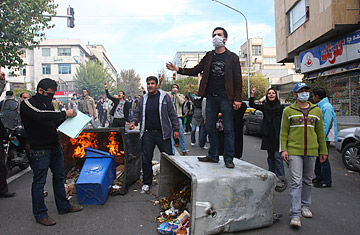
Opposition protesters in Tehran on Nov. 4, 2009, chant slogans as a garbage can is set on fire on the sidelines of state-sanctioned rallies to mark the 30th anniversary of the U.S. embassy takeover
Even while Iran's security and plainclothes Basij forces dispersed opposition rallies on Wednesday with tear gas and batons, Iran's state-run media were complaining that foreign coverage of the 30th anniversary of the U.S. embassy takeover was not, to use an American phrase, fair and balanced. The Islamic Republic News Agency, as part of its coverage of the protests in Tehran, wrote that global news television stations such as al-Jazeera, CNN and France 24 were "seeking to create widespread unrest ... by broadcasting phony stories and images." Instead of reporting on the "epic public turnout" for pro-government rallies outside of the former U.S. embassy, foreign news reports "referred to a small group of agitators as 'the people of Tehran.' "
For the record, thousands of individuals did take part in the official pro-government protests, located on Taleghani Street outside of the former U.S. embassy. On neighboring streets, TIME observed hundreds of parked buses that had brought in many of the attendants, including schoolchildren, from outside of Tehran. Young Iranians, separated into groups of boys and girls carrying Iranian flags, marched between the buses and chanted slogans against American power. Yet many of them seemed less interested in vehement denunciation of the U.S. than in taking a rare opportunity to glance furtively at the opposite sex. Nor was the annual political ritual's turnout any more "epic" than attendance at most state functions.
Meanwhile, the four metro stations near the old embassy were closed to residents, forcing tens of thousands of people who wished to attend opposition rallies to walk on foot around the winding cordon of riot police. As protesters were pushed away from planned meeting spaces, smaller groups of hundreds of people continued to march in nearby areas. TIME witnessed security forces lob tear-gas canisters into one such crowd, scattering young and old green-clad Iranians into allies and side streets. Some demonstrators — by now seasoned veterans in confronting the police — counseled that applying cigarette smoke to the eyes eases burning sensations, as opposed to dousing the eyes with water. This led to odd moments where teenage boys were seen blowing smoke into the eyes of elderly women and vice versa.
Given that many Iranian politicians and citizens have criticized the state-run media for a lack of fair and balanced coverage, the fact that most domestic news outlets reported at all on the opposition protests was striking. Instead of denying the existence of an opposition in Iran, pro-government news organizations now use the more savvy method of spin — questioning the motives, members and supporters of the "Green Movement."
But now that another day of challenge to the government in Iran's streets has passed, with both sides declaring victory, where does the continuing post-election crisis in Iran stand? President Mahmoud Ahmadinejad faces a defiant popular movement, whose leaders and participants refuse to back down, even as many of its members continue to be imprisoned and sentenced with heavy jail terms. He has also been doggedly attacked by conservative members of the Iranian parliament on both domestic policy and the formerly sacrosanct issue of negotiations with the West on Iran's production of nuclear energy. On Oct. 27, the head of the Parliamentary Energy Committee stated that Russia, which has positioned itself as a key player in any deal between Iran and the West, "has turned its back on Iran many times ... despite Russia's claim to be Iran's friend." This statement, one of many coming from conservative political circles in the past week, seemed to undercut the President's recent proclamation of the result of nuclear talks with the West as an Iranian "win." And when Ahmadinejad unexpectedly showed up in parliament on Nov. 3 to push for his version of a bill to reform Iran's food and energy subsidies, speaker of the parliament and powerful conservative Ali Larijani gave him icy treatment. Even before the 2009 presidential election, Iran's parliament served as a source of criticism against the perceived managerial incompetence of the President.
Underlying the daily bickering is the increasing realization that, owing to the ongoing political battles in the months since Iran's disputed election, Ahmadinejad's government may be growing weaker rather than stronger. In the weeks and months ahead, observers should watch to see whether the popular Green Movement or Ahmadinejad's conservative rivals will be the ones to benefit, or whether this is the beginning of a long stalemate in Iranian politics.
